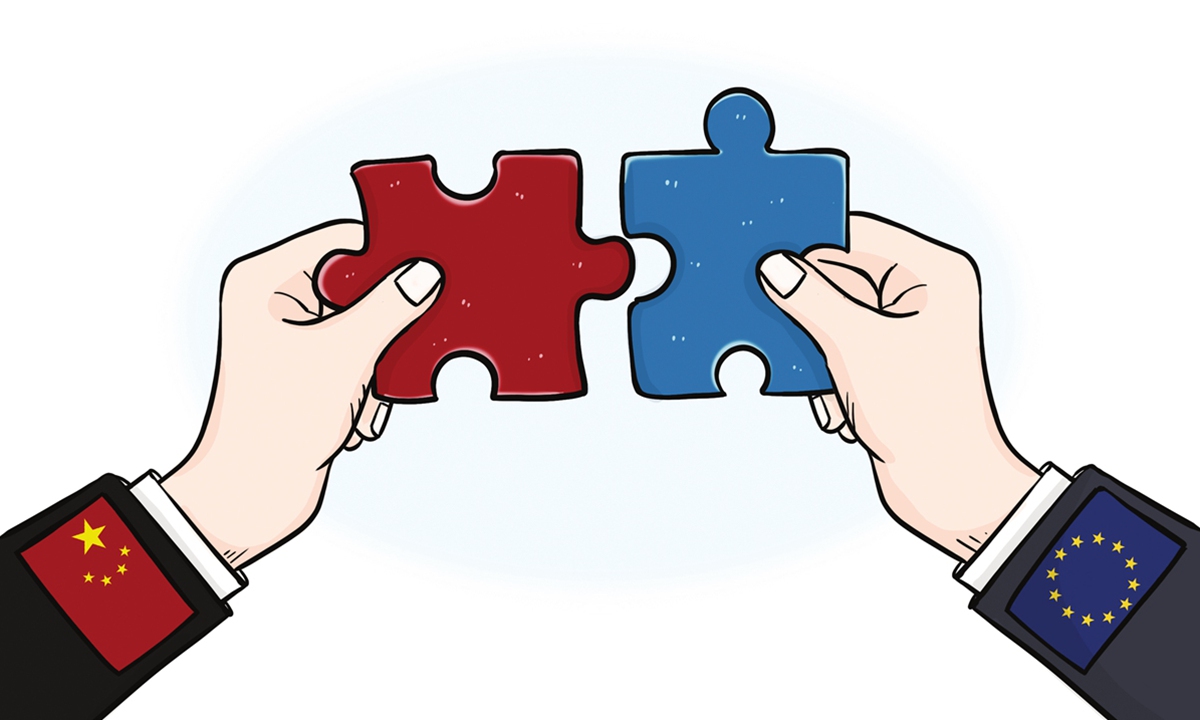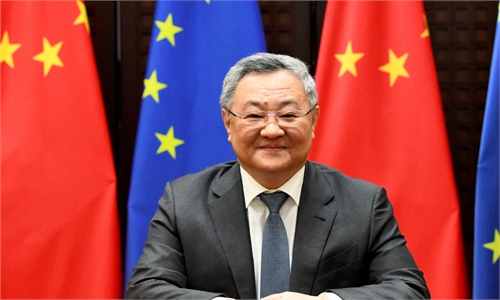From 'de-risking' to 'healthy interdependence': Europe needs to change its thinking toward China

China EU relations
The 24th EU-China Summit took place in Beijing on Thursday. This was the first in-person EU-China Summit since 2019. The summit has offered a good opportunity for China and the EU to engage with each other at the highest level and to pursue constructive and stable EU-China relations.
Since the beginning of this year, when the EU officially proposed its de-risking strategy toward China, the controversy surrounding it has never ceased. Although the EU has repeatedly emphasized the difference between de-risking and decoupling, in reality, there is no difference. This strategy brings great disruption to China-EU relations, and even within Europe itself, there are doubts about this policy. Therefore, some European scholars have proposed changing the ineffective and even dangerous risk mitigation toward China and instead establishing a "healthy interdependence" relationship.
Indeed, there are differences between China and Europe, especially in the economic and trade fields where European protectionism has been on the rise. However, both sides should seek and build positive and stable factors to establish a rational relationship that is more in line with the current international political and economic reality and their respective interests.
First, de-risking is not realistic. China and Europe are at different stages of development, and their industrial structures have certain complementarity. This is an undeniable fact. Over the past 40 years, China's influence in the global value chain has been increasing, with manufacturing output accounting for more than 30 percent of the world's total.
According to analysis by Rhodium Group, even if a large amount of foreign direct investment seems to flow to substitute countries, in the end, only a small part of China's production and export capacity can be transferred abroad.
Second, there are fundamental differences between the US and Europe in their approach to China. While the US aims to maintain global hegemony and tries to contain China by building "small yards and high fences," Europe has no intention or ability to confront China. There is no fundamental geopolitical conflict between China and Europe. Europe does not want to be forced to choose sides but rather wants to choose its relationship with the outside world based on its own interests.
However, the conflict between Russia and Ukraine has dealt a severe blow to Europe's strategic autonomy. Nevertheless, Europe has always been reluctant to give up balance because increasing dependence on the US comes at a high cost. Sometimes Europe hopes to balance China with the help of the US, but it also understands that maintaining and strengthening cooperation with China can enhance its influence over the US.
Third, European internal interests are diverse. Some European governments advocate de-risking, while some countries tend to continue strengthening their trade ties with China. During the official visit to China in June 2023, Hungary's foreign minister even described de-risking as an act of "suicide" for Europe. Even within a single country, there are also disputes on how to handle relations with China. Former German foreign minister Sigmar Gabriel once said, "If you kick the Chinese in the shins from Monday to Friday like Mrs Baerbock [German incumbent foreign minister], you won't get far."
Fourth, political relations are crucial. Over the past year, there have been frequent high-level exchanges between China and Europe, from German Chancellor Olaf Scholz, French President Emmanuel Macron, Spanish Prime Minister Pedro Sanchez, to European Commission President Ursula von der Leyen and High Representative for Foreign Affairs and Security Policy Josep Borrell. These trips indicate that the window for dialogue between China and Europe has not been closed. As long as both sides are willing to meet and talk, the risk of strategic misjudgment will be reduced.
Fifth, the European economy has practical needs. Currently, inflation in Europe has eased, but the economy remains sluggish. In 2022, EU's trade deficit with China reached nearly 400 billion euros ($431 billion).
In fact, besides the increase in commodity prices, the surge in EU's trade deficit with China is largely due to the strengthening export restrictions on high-tech products to China, more localized production by European companies in China, and the forced adjustment of industrial chains. These are additional costs of de-risking. Therefore, some European scholars are reflecting on whether de-risking is increasing risks and whether the attempt to move away from crises will actually lead to self-actualizing crises.
Of course, there are many other factors that affect China-EU relations. However, at least from the above perspectives, China-EU relations should not be limited to competition or confrontation but should include cooperation and win-win outcomes. The key is to maintain a rational attitude and comprehensive view on China-EU relations. Perhaps the EU may find it difficult to fundamentally change its current mentality toward China, but the concept of "healthy interdependence" seems to better reflect the reality between the two sides and is easier to be accepted psychologically.
The author is a professor with the School of International Relations at Beijing Foreign Studies University. opinion@globaltimes.com.cn

